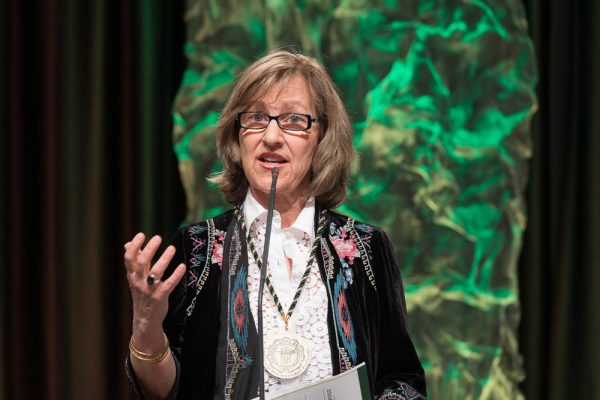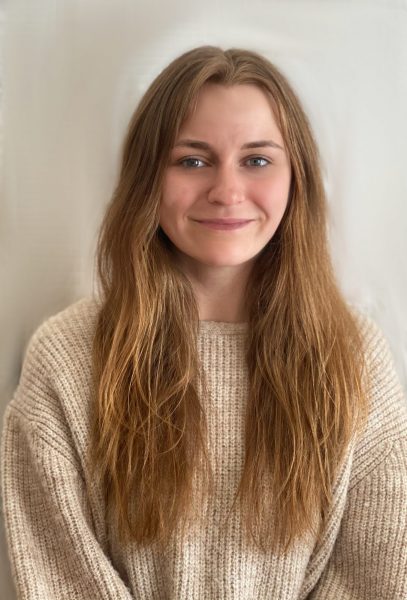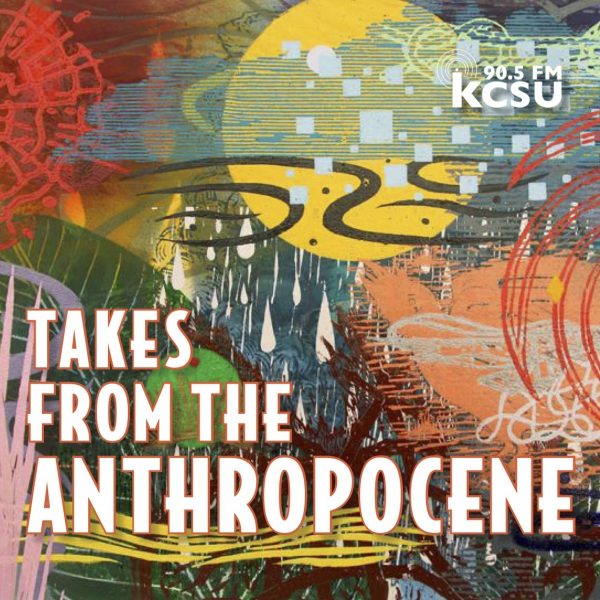Public Anthropology students offer “Takes from the Anthropocene” on podcast series
Joshua Zaffos
Climate change, ocean pollution, freshwater scarcity. Healthcare inequity, Indigenous rights, structural violence. Such looming global matters often feel overwhelming to individuals and communities – and they are typically topics we choose to avoid in casual conversations.

Professor of Cultural Anthropology Kate Browne has dedicated her career as a university researcher and instructor to addressing such heady and extensive problems head-on – and enabling students to tackle them, too. Last fall, Browne charged undergraduate students in Public Anthropology and Global Environmental Challenges (ANTH 405) to explore worldwide social and environmental issues and dilemmas through course projects that would specifically engage people outside class – and outside the field of anthropology. To accomplish that, students in the class created a podcast series and brought public anthropology to airwaves and earbuds.
Takes from the Anthropocene illuminates how anthropology, writ large, frames and addresses those overwhelming global social and environmental challenges. The series of fourteen student-reported and produced episodes – which has aired on KCSU and is also available via Apple and Spotify Podcasts – is both exploration and practice of public anthropology.
To learn more about the podcast series and public anthropology, we reached out to Amanda Kowalski, an Anthropology and Geography double major and ANTH 405 student. Kowalski talked about how public anthropology has influenced her and given her hope toward solving worldwide challenges. “I wish I could make every person in my life take this class,” Kowalski said. She also spoke about why podcasting suits public anthropology, her episode, “Public anthropologists, better framing solve big problems,” and how anthropologists can more knowingly apply framing and social constructs of issues to effectively communicate with non-researchers.
Amanda Kowalski

How do you explain what is public anthropology?
I see public anthropology as a cord that connects all of the subfields. It’s a guiding framework that can boil down any anthropological question into two parts: How does this impact the public? How can we successfully communicate those impacts to everyone? Not just to other academics, but everyone.
Why do you think it’s important to “do” public anthropology and share these concentrations with people outside the fields?
I say in the podcast episode that research for the sake of research is lazy, and I mean that with the deepest sincerity. Let’s say I conduct a stellar study and discover incredible results— great. But why does that matter if those findings get tucked away in a file cabinet or published in an academic journal that the majority of the population of the US won’t read? Public anthropology addresses this issue. It takes the incredibly powerful findings that anthropologists uncover and finds ways to successfully transmit those ideas to non-experts and experts alike. It bridges a gap that’s been unaddressed between academics and the public for decades. Most importantly, it gets people to care about issues that have massive impacts on their lives! Topics can be translated in ways where the information actually sits with the audience, which is desperately needed in order to enact any sort of change in the world.
“Public anthropology takes the incredibly powerful findings that anthropologists uncover and finds ways to successfully transmit those ideas to non-experts and experts alike. Most importantly, it gets people to care about issues that have massive impacts on their lives!”
Why a podcast for Public Anthropology? Why do you think podcasts are effective for this type of communication and public anthropology as a field?
Podcasts are fantastic. I was a huge fan of podcasts before I ever learned what public anthropology was, and now I think it’s safe to say that I am obsessed with podcasts for a couple of reasons.
First of all, podcasts are highly accessible for the listener. Unlike TV shows or books, you don’t need to actively watch or read to understand what’s going on. So I can cook dinner when I listen to a podcast, or I can workout, or take my dog on a walk, etc. In times when we seem to constantly be multitasking in some way with technology, podcasts have an edge over other media forms.
Second, podcasts are personal. It may seem obvious, but listeners can hear the person talking to them. Yes, good writers can develop strong voices in their work. But even then, there’s a level of distance there that podcasts overcome. Actually hearing somebody’s voice makes readers feel more connected to both the speaker and the topic they are discussing. This matters for public anthropology because we can talk about some pretty complex topics!
Finally, podcasts are just plain-out fun. They allow speakers to be themselves, be personal, be creative, in ways that are not traditionally facilitated through academic journals. You can joke in a podcast. You can pose thought provoking questions. You can tell stories. These are tactics that pull in people and keep them listening. As an anthropologist trying to convey complex ideas and findings from my research, this is vital. Ask yourself, would you rather read a ten-page, 8-point font journal article or listen to a podcast?
Why did you choose to research and report on framing and why should anthropologists should pay more attention to framing?
I’ve always been deeply interested in why people believe what they believe and why certain topics can raise such intense conflict between people. Dr. Browne introduced us to framing in the middle of the semester and immediately I knew that this was something I’d use for the rest of my academic career.
Even if we don’t directly address framing in our work, anthropologists deal with framing all the time. Anthropologists study humans. We burrow into the nitty gritty details of what people do, where they do it, why they do it, and how they do it. We can look at their symbols, their language, what makes them happy, what gives them comfort, how they express themselves and— you guessed it— their frames. This matters because framing is critical for how people receive and process information.
As academics, we forget that everybody doesn’t share the same frames as us—specifically when it comes to seeing the validity of knowledge generated by science and the liberal arts. So if we go to apply our findings to the public, we find that they often don’t sink in the way we want them to. Anthropologists can be the key to fixing this. We can identify the unique frames of individual audiences and cater findings from research to those frames. I knew right away that I wanted to discuss this in my podcast.
 You seem to project genuine excitement and poise in your episode – that’s not always easy! How did you and your classmates prepare for this project in terms of selecting topics and learning practices for podcasting and speaking for radio?
You seem to project genuine excitement and poise in your episode – that’s not always easy! How did you and your classmates prepare for this project in terms of selecting topics and learning practices for podcasting and speaking for radio?
Throughout the semester Dr. Browne covered a handful of topics that public anthropology can tackle. These were topics like the pandemic, structural racism and violence, the climate crises, environmental degradation, and global health inequities. She guided us through the semester with a mix of podcasts, magazine articles, journal articles, films, and books. Each week we had to translate the complex ideas that we discussed in class into palatable, dare I say, enjoyable blogs for others to read. Throughout the semester we were building up the mental muscles to translate academic language to public language.
When it came time for the podcast, we chose a topic from the semester and expanded it, using the resources from each week to guide our argument. We also had to present some sort of individual or group work to the class each week, and we held discussions and debates that were great for building speaking skills.
We met with Dr. Browne and a member from the KCSU radio team to hash out how to actually do a podcast, and he was great in giving us advice about staying relaxed and just trying to have fun with it. When it came to actually recording the podcast, my partner Charles and I went over some loose scripts we developed, sat down, and went for it!
“Public anthropology works. It reaches people. It sticks with them. It spurs change. Personally, I think it deserves a massive role in generating solutions for the problems we face today and in the future.”
How did this course and Dr. Browne and the podcast project influence you as a student and a young professional in anthropology and geography?
I wish I could make every person in my life take this class. It was tough in the sense that sometimes the topics we covered were frankly depressing. Learning about all of the world’s problems— many of which don’t have clear answers— left some classes ending on a solemn note. But at the same time, the enormity of those problems invites innovation for equally enormous solutions. I remember mentioning to Dr. Browne once that the class made me angry; it made me want to do something! Dr. Browne offered a solution: public anthropology. She forced us out of our comfort zones. I’d never considered writing a blog, submitting to a newspaper, or making a podcast before! I remember reading the syllabus, seeing the deliverables for the class and thinking “What have I gotten myself into?”. But here I am a semester later with solid accomplishments that developed my professional resume and boosted my confidence as a writer and a speaker.
These projects that seemed so daunting six months ago I’d now do again in a heartbeat. Most importantly, this class left me with a solid foundation of hope for the future. Public anthropology works. It navigates through cultural, religious, socioeconomic, political, racial, and generational divides that normally hinder meaningful communication. It reaches people. It sticks with them. It spurs change. Personally, I think it deserves a massive role in generating solutions for the problems we face today and in the future.
Professor Kate Browne and Amanda Kowalski will participate in an upcoming virtual panel, “Anth to the People! Public Anthropology in the 21s Century,” on Friday, April 2, noon to 1 p.m. The virtual panel and discussion is open to the public and will also include professors and students from other anthropology concentrations. Meeting link: https://col.st/EicYE
Check out all fourteen episodes of the Takes from the Anthropocene podcast via KCSU